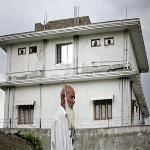August 09, 2011

Photo: Reuters
A resident walks past the compound where U.S. Navy SEAL commandos reportedly killed al-Qaida leader Osama bin Laden in Abbottabad May 5, 2011 (file photo)
The relationship between the United States and Pakistan has been severely strained in recent months. Two former top U.S. intelligence officials say the relationship has been sorely tested because Pakistan has been trying to have it both ways by cooperating with U.S. counterterrorism efforts while maintaining ties with Taliban groups.
In separate interviews, ex-Central Intelligence Agency Director Michael Hayden and former Director of National Intelligence Dennis Blair both say Pakistan is trying to use Taliban groups to maintain influence in Afghanistan.
Hayden, who served as CIA chief from 2006 to 2009, says Pakistan's army and its primary intelligence agency, the Inter-Services Intelligence directorate (ISI), have been using the Haqqani network as leverage.
"It is clear, it is unarguable, that the Pakistani government, particularly the Pakistani security establishment - the army and the ISI - view the Haqqani network, that's the Taliban group in North Waziristan, [as] more of an - in their calculus they know it's an enemy of the United States, but in their calculus it's dominated by the fact that they believe that the Haqqani network is a friend of Pakistan. And that may be the single most troubling aspect of the relationship: our divergence of views on that particular network," said Hayden.
The Haqqani network is viewed as perhaps the most lethal of the Afghan Taliban groups, crossing into Afghanistan from its safe havens in Pakistan's tribal areas to mount attacks on NATO forces.
Former Director of National Intelligence Dennis Blair says Pakistan is playing both sides in anticipation of the eventual U.S. withdrawal from Afghanistan.
"They were hedging, frankly," said Blair. "There were trying, and they still are, to take advantage of the help that they can get from the United States while still thinking, well, maybe the United States won't be here, maybe we have to look out for our own interests, and we need contact with many different groups, both countries and these various terrorist groups. And in addition, they have a tradition of trying to play off these extremist groups against each another."
Both men give Pakistan some praise for its counterterrorism cooperation. Hayden says the country has been a "powerful" counterterrorism partner and that the United States has captured more senior al-Qaida personnel with Pakistani help than any other nation.
But the U.S. has been urging Pakistan to be more aggressive in moving against Taliban and al-Qaida safe havens. Blair says Islamabad has been reluctant to do so.
"Pakistan has suffered more terrorist attacks than any other country," Blair noted. "But they still have this idea that they can maintain contact with lots of groups, choose their friends, work against their enemies. And they just haven't made the strong decision that we need to clean up our own country, go against terrorist groups, whoever they are, whether they threaten Pakistan, India, the United States, Afghanistan, or anybody else."
From the Pakistani side, statements from officials attest to anger over U.S. drone strikes on terrorist targets in its tribal regions, the presence of U.S. intelligence operatives on its soil, and, most recently, the U.S. incursion into Pakistan to kill Osama bin Laden.
The U.S. team clandestinely crossed into Pakistan in darkness on May 2 and found the al-Qaida leader hiding in a compound in the city of Abbottabad, not far from Pakistan's military officer academy. The team killed bin Laden and made it back to Afghanistan unhindered by Pakistani forces.
Hayden, a retired Air Force general, says the bin Laden raid merely underscored a relationship between Washington and Islamabad that has been in a downward spiral for some time.
"I rather look upon it as - particularly the Abbottabad raid - it may have affected the relationship," said Hayden. "But fundamentally, what it did to the public is to rip the curtain back from the relationship. That relationship has always been difficult. And the space, the space in which American and Pakistani interests - or perceived interests - are overlapping or identical has gotten quite small."
The fact that Pakistan was not informed of the raid in advance infuriated Pakistani officials. But Blair, a retired Navy admiral, says the Obama administration made the right call to not inform the Pakistanis in advance because of the fear of leaks.
"Unfortunately, we find that when Pakistan gets a piece of information it evaluates whether it will use that piece of information for its own interests and not necessarily for our interests," Blair added. "So I have no quarrel with the judgment that was made that the United States needed to take action itself this time. And frankly, Pakistan needs to know that there are certain things that the United States is not going to fool around on, and this person who led this attack that killed 3,000 Americans. And getting him was not something we were going to entrust to others. We were going to do that one ourselves."
Analysts think that bin-Laden's replacement, Ayman al-Zawahiri, and his core followers are hiding somewhere in Pakistan's remote tribal regions. A recent analysis by the Combating Terrorism Center at the U.S. Military Academy says there is a far closer relationship between al-Qaida and the Haqqani network than has been commonly believed.